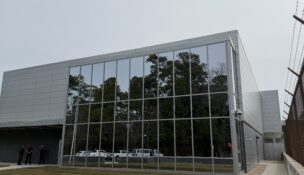Senate Democrats, AG Miyares duel over rejected university board appointees
Senate majority leader says defiant boards could face consequences
Kate Andrews //June 12, 2025//

Virginia Attorney General Jason Miyares

Virginia Attorney General Jason Miyares
Senate Democrats, AG Miyares duel over rejected university board appointees
Senate majority leader says defiant boards could face consequences
Kate Andrews //June 12, 2025//
SUMMARY:
- Democratic-controlled state Senate committee rejected eight appointees to three universities’ boards by Republican Gov. Glenn Youngkin
- Virginia AG Jason Miyares says because it was a committee, not the whole legislature, vote is invalid and appointees can serve
- Democratic Senate Majority Leader Scott Surovell says rejected appointees cannot serve under state law, and defiant board members will face consequences
Updated June 13
Like Schrödinger’s cat, the eight failed appointees to three Virginia universities’ boards are simultaneously valid members or not, depending whom you ask.
Virginia Attorney General Jason Miyares, in a June 11 letter to the state’s public universities’ rectors, wrote that the eight people — including former Attorney General Kenneth Cuccinelli, whom Gov. Glenn Youngkin appointed to the University of Virginia‘s Board of Visitors in March — remain members “with the rights and responsibilities conferred upon a member of a board of visitors.”
State Senate Majority Leader Scott Surovell, D-Fairfax, has the opposite view. Cuccinelli and seven appointees to the George Mason University and Virginia Military Institute boards are no longer active members following an 8-4 Senate Committee on Privileges and Elections vote Monday to reject their appointments, he says.
Further, Senate Clerk Susan Clarke Schaar sent a letter Tuesday to Secretary of the Commonwealth Kelly Gee advising her of the committee vote — by direction of Sen. Aaron Rouse, D-Virginia Beach, the committee’s chair — and noting that the Constitution of Virginia says, “No person appointed to any office by the Governor, whose appointment is subject to confirmation by the General Assembly … shall enter upon, or continue in, office after the General Assembly shall have refused to confirm his appointment, nor shall such person be eligible for reappointment during the recess of the General Assembly to fill the vacancy caused by such refusal to confirm.”
The party line vote this week by the Democratic-led Senate committee, which has voted to confirm thousands of other board and commission appointments by the governor, came in response to what state Democrats feel has become an overly partisan scheme by Youngkin to exercise ideological power over the state’s public universities.

Charles J. Cooper, a Florida appellate attorney who represented former U.S. Attorneys General Jeff Sessions and John Ashcroft and served as a U.S. assistant attorney general under President Ronald Reagan, was among the rejected appointees to George Mason’s board, along with Caren Merrick, who served as the state’s immediate past commerce secretary under Youngkin. William Hansen, a former U.S. deputy secretary of education under President George W. Bush, and Maureen Ohlhausen, a former Federal Trade Commission chair, were also rejected by the Senate committee.
VMI appointees John Hartsock, deputy chief of staff for U.S. Rep. Ben Cline; Stephen Reardon, an attorney with Spotts Fain; and Jose Suarez, a Florida businessman, were also rejected, mainly because of the timing of their appointments shortly after the General Assembly had adjourned from its regular session, Surovell said in an interview Thursday with Virginia Business.
He noted that the Lexington military institute’s board, including the three new members, took a controversial vote not to renew the contract of VMI’s first Black superintendent, retired Army Maj. Gen. Cedric Wins, who was hired in late 2020 on an interim basis and then offered the permanent post in 2021.
The governor’s VMI appointments of Hartsock and Reardon were announced in late February and days later, the vote to oust Wins took place, Surovell said, calling the timing of the appointments, which didn’t allow the legislature to take a confirmation vote without calling a special session, a “deliberate political stunt” by the governor. Suarez was appointed in April, after the vote.
Surovell added that he has heard from current and former board members who said that Youngkin has “inappropriately” tried to influence boards, which have hiring and firing power of university presidents, “in ways that no governor has done before,” including calling BOV members to tell them how to vote.
The governor’s office did not respond to questions about this allegation and other matters Thursday and referred Virginia Business to the attorney general’s letter, “which refutes the claim made by General Assembly Democrats, including Sen. Surovell in his letter, that action by a single committee of one house of the General Assembly constitutes action taken by the General Assembly as a whole,” spokesperson Peter Finocchio said in an email.
On June 9, Surovell sent a letter to the the state’s rectors, some of whom were appointed by Youngkin and others by former Gov. Ralph Northam, a Democrat, affirming that the legislature has authority over confirmation of gubernatorial appointees.
“As you are aware, Virginia’s public universities operate under a framework established by the Code of Virginia and are subject to the ultimate authority and control of the General Assembly of the Commonwealth of Virginia,” Surovell wrote. “It is important to understand that Virginia is currently and for the next six months will experience divided government. This means that governance of our universities is a shared exercise between coequal branches of government.”
Miyares, however, wrote in his letter to the rectors, who lead their universities’ boards, that Surovell made a “false statement” in his letter that “appears designed to mislead you into thinking that the General Assembly as a whole has taken action, when in fact it has not. Citing no authority for his claim, the senator goes on to offer you guidance that is legal in nature.”
U.Va. Rector Robert D. Hardie, a Northam appointee, then contacted Surovell, an attorney, seeking clarification about Cuccinelli’s status, and Surovell addressed a letter Wednesday to Hardie saying, “Ken Cuccinelli is no longer eligible to serve as a member of the UVA Board of Visitors and must immediately cease all activities in that capacity.
“Contrary to [Miyares’] public comments, it is important to note that neither the Constitution of Virginia nor the Code of Virginia requires the entire legislature to vote on gubernatorial nominations,” Surovell continued in his letter to Hardie. He added that Youngkin had previously accepted rejection of other appointees, including some that were not voted on by the entire legislature, and named new appointees for confirmation.
Further, if rectors or other board members officially recognize the rejected board appointees, they “would be violating both the Constitution of Virginia and the Code of Virginia.”
In Thursday’s interview, Surovell said that there could even potentially be “criminal consequences” for board members who ignore the vote and recognize rejected nominees as full board members.
“Such conduct would constitute ‘malfeasance and incompetence’ … and would provide grounds for removal of any board member who permits such violations” by Youngkin or his successor, Surovell wrote. Only governors have the authority to remove board members, as Youngkin did earlier in the year with former U.Va. board member Bert Ellis, whom Cuccinelli was named to replace.
In addition to hearing from Hardie, Surovell said that he had heard from VMI’s board president, NewMarket Chairman and CEO Teddy Gottwald, who “said he didn’t understand why we were upset.”
On Friday, VMI provided Gottwald’s June 10 response to Surovell, in which he noted that the General Assembly rejected two earlier appointees to the board, in addition to the three this week, “with little explanation, leaving us to wonder about the reasoning. Quintin Elliott served for more than twenty years in the Virginia Air National Guard and was later named Deputy Secretary of Transportation by Governor Northam. Clifford Foster is a highly respected financial professional who has given back to VMI extensively. Both were expected to strengthen our Board Finance Committee.”
Gottwald added that he views Hartsock, Reardon and Suarez, all alumni and former service members, as “equally qualified. … I respectfully take exception to any suggestion that these five individuals somehow do not possess the judgment, character or willingness to follow good governance practices per your letter.” Also, he wrote, he is “not aware of any directive, binding or otherwise, that the Governor has given members of our BOV. I believe that any suggestion of that sort has no basis in fact.”
Specifically addressing the non-renewal of Wins’ contract, Gottwald wrote, “This tough decision has been unpopular with some, and due to the sensitive nature of this personnel matter, the BOV has not commented on it. Our decision was based on several years of performance reviews, together with an assessment of our institutional needs, and then made after thoughtful and thorough discussion. Governor Youngkin was not involved in this decision, nor am I aware of any directive or guidance from the Governor on this decision to any Board member.”
Gottwald concluded his letter to Surovell by asking him to share specifics of “any undue interference from Governor Youngkin with any of our Board members,” but does not directly address the conflicting opinions over whether the Senate committee’s board appointment vote is valid.
George Mason University’s rector, The Heritage Foundation’s Charles “Cully” Stimson, had not contacted Surovell as of earlier Thursday, but the senator said he had heard that Stimson, another Youngkin appointee, “was very defiant.”
Miyares’ office, Hardie and Stimson did not respond to requests for comment by Virginia Business Thursday, nor did Cuccinelli, although The Washington Post reported that the former state attorney general and first-term Trump official said in a statement that he looked forward to serving on U.Va.’s board “until next June if confirmed by the General Assembly, or until this coming February if not.”
Meanwhile, Youngkin is expected to make more university board of visitors appointments to take effect July 1 as former members rotate off boards.
Surovell said the General Assembly doesn’t typically sue people, but he added, “We can take into account the behavior of these boards when we return in January.”
This article has been corrected since publication; Teddy Gottwald is currently VMI’s board president, but Col. James Inman will succeed him July 1, according to VMI. Also, VMI board appointee Jose Suarez was appointed in April, after the vote to not extend retired Army Maj. Gen. Cedric Wins’ contract as superintendent.
r

















